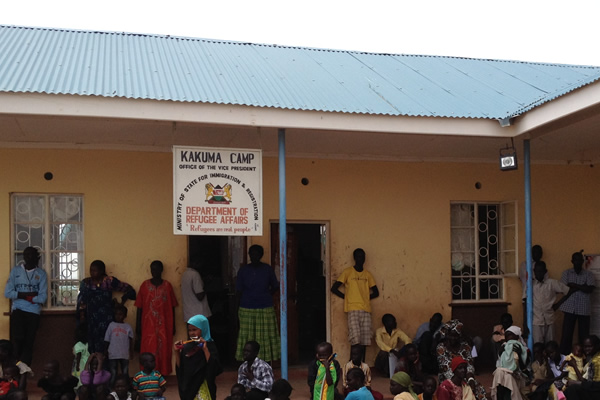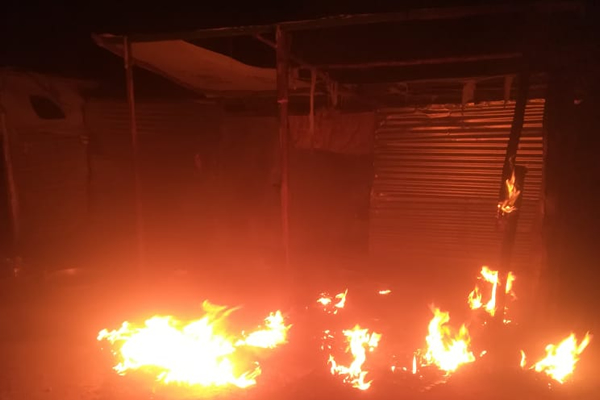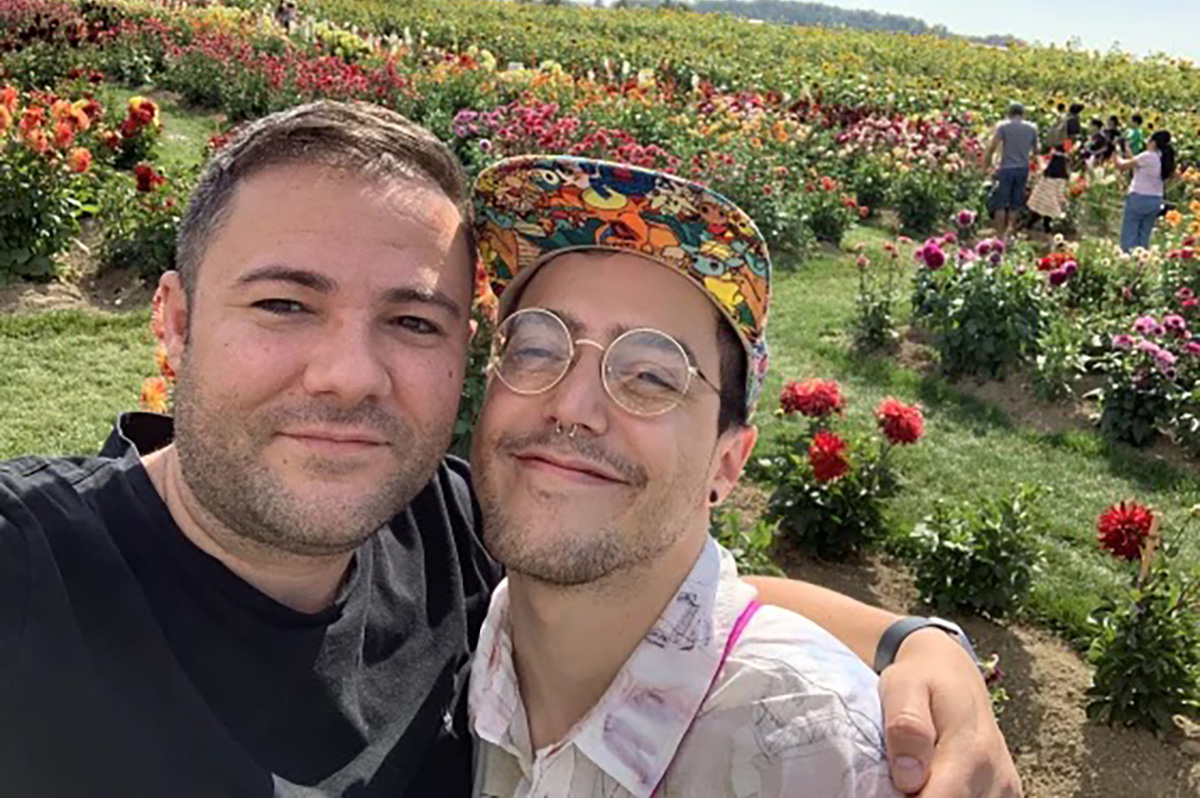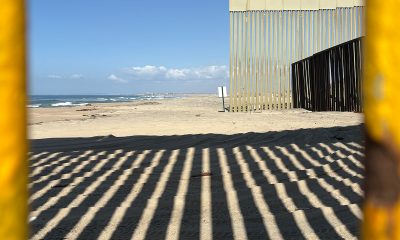World
Report details anti-LGBTQ discrimination, violence in Kenya refugee camp
March 15 attack left gay man dead

A new report released on Wednesday indicates nearly all of the LGBTQ people who live in a Kenya refugee camp have experienced discrimination and violence because of their sexual orientation and/or gender identity.
The Organization for Refuge, Asylum and Migration and Rainbow Railroad in May 2021 surveyed 58 LGBTQ asylum seekers who live at the Kakuma refugee camp and the Kalobeyei Integrated Settlement that opened in 2016 to help alleviate overcrowding at Kakuma. The groups also interviewed 18 “key informants.”
More than 90 percent of the LGBTQ asylum seekers who spoke with ORAM and Rainbow Railroad said they have been “verbally assaulted.”
Eighty-three percent of them indicated they suffered “physical violence,” with 26 percent of them reporting sexual assault. All of the transgender respondents “reported having experienced physical assault,” with 67 percent of them “reporting sexual assault.”
Eighty-eight percent of respondents said they had been “denied police assistance due to their sexual identity.” Nearly half of the respondents told ORAM and Rainbow Railroad they had to be “relocated from their allocated shelters to alternative accommodation due to the constant abuses directed at them by neighbors.”
Kakuma, which is located in northwest Kenya near the country’s border with Uganda and South Sudan, is one of two refugee camps the U.N. Refugee Agency operates in the East African nation. The other, Dadaab, is located near Kenya’s border with Somalia.
The report notes upwards of 160,000 refugees from South Sudan, Sudan, Somalia, the Democratic Republic of Congo, Burundi, Ethiopia and Uganda were living in Kakuma as of January.
Those who responded to the ORAM and Rainbow Railroad survey are from Uganda, Burundi, the Democratic Republic of Congo, Sudan, South Sudan, Rwanda, Afghanistan, Yemen and Ethiopia and all of them have asked for asylum in Kenya. Ninety-four percent of them live in Kakuma, while the remaining six percent live in Kalobeyei.
The report also estimates there are 350 LGBTQ asylum seekers in Kakuma and Kalobeyei. UNHCR in 2020 created Block 13 in Kakuma that is specifically for LGBTQ refugees.
Gay man died after Block 13 attack
Two gay men suffered second-degree burns during an attack on Block 13 on March 15. One of the men died a few weeks later at a hospital in Nairobi, the Kenyan capital.
Forty-one of the Block 13 residents who participated in the ORAM and Rainbow Railroad survey said that “relocation to a safer place as a priority.” The report also notes some respondents who live outside Block 13 “said that the activism in Block 13 was affecting the overall relationship between LGBTQI+ asylum seekers and service providers in the camp.”
“They expressed concern with some activities conducted as part of their activism,” reads the report. “For example, they alleged that some activists were conducting staged attacks on individuals and false claims of violence to attract media attention as part of their advocacy.”
The report notes “allegations of activity from activists in Block 13 have not been confirmed.” Some of the “key informants” who ORAM and Rainbow Railroad interviewed for their report, however, “observed that LGBTQI+ activists from different countries have been supporting the advocacy in Block 13 without considering the local context and potential negative or unintended consequences.”
“They allege that the advocacy has been antagonizing LGBTQI+ members with other refugees in the camp and service providers,” reads the report. “For example, some of the LGBTQI+ asylum seekers were reported to have deserted their allocated shelters, moved to Block 13 and were persistently demanding new shelters.”

UNHCR in a statement after the March 15 attack noted Kenya “remains the only country in the region to provide asylum to those fleeing persecution based on sexual orientation, gender identity or expression,” even though consensual same-sex sexual relations remain criminalized. The ORAM and Rainbow Railroad report acknowledges both points.
“Asylum seekers and refugees in Kenya are not immune to pervasive anti-LGBTQI+ attitudes in the community,” it reads. “As the number of LGBTQI+ asylum seekers and refugees increases rapidly, it is important to understand their unique protection needs and plan for safe and dignified service delivery to meet those needs.”
The report notes more than 70 percent of respondents have gone to Kakuma’s main hospital the International Rescue Committee operates in order to receive HIV/AIDS-related services. More than 85 percent of respondents said they “preferred to seek all other health services beyond HIV and AIDS services at the main hospital, since the facility was friendly and provided a stigma-free environment for the LGBTQI+ community in the camp.”
“Respondents reported traveling long distances in order to visit the main hospital,” reads the report.
The report notes limited access to cardiologists and other specialists at the eight health facilities in the camp that UNHCR partner organizations operates. Roughly a third of respondents also said they have “been stigmatized in some of the health clinics.”
“This included being referred to as shoga (a derogatory Kiswahili term used to refer to homosexuality) either by staff members or other refugees in the waiting room while waiting to see a provider, or some providers just directing them to the main hospital with snide remarks about how they do not entertain LGBTQI+ persons in their facility,” reads the report.
The African Human Rights Coalition, the Refugee Coalition of East Africa and Upper Rift Minorities are among the other groups that work with the camp’s LGBTQ residents.
The report notes only a third of respondents “were actively engaged in economic activity at the time of the study, a majority depended on the food rations distributed in the camp.” It also contains 10 recommendations, which are below, to improve conditions for LGBTQ refugees in Kakuma.
1) The Refugee Affairs Secretariat of Kenya must fast-track refugee status determination of LGBTQ asylum seekers with further support from UNHCR and civil society organizations.
2) The Refugee Affairs Secretariat of Kenya and UNHCR must create more responsive and sensitive protection services for LGBTQ refugees in Kenya.
3) Civil society organizations and their supporters should provide livelihood support and other support to meet the immediate needs of LGBTQ refugees in Kakuma.
4) Governments of resettlement countries must resume and fast track resettlement of LGBTQ refugees from Kenya.
5) UNHCR and civil society organizations must continue to build skills development programs for employability.
6) LGBTQ civil society organizations should work more closely with refugee-led organizations and collectives to build self-protection services.
7) Donor communities should participate in more long-term development programming for LGBTQI+ refugees in Kenya.
8) LGBTQ civil society organizations providing support to refugees in Kenya must coordinate more closely.
9) LGBTQ civil society organizations and refugee-led organizations should continue to advocate for more inclusive human rights in Kenya.
10) Civil society must continue the push for LGBTQ human rights globally, including decriminalization of same sex intimacy.
“This much-needed report underscores the challenges, dangers and complexities of life that LGBTQI+ refugees and asylum seekers face in Kakuma refugee camp,” said ORAM Executive Director Steve Roth in a press release that announced the report’s release. “The refugees themselves have spoken and they want to be heard. UNHCR, governments and civil society organizations must work together to ensure the immediate safety and well-being of this community while also addressing the longer term, durable solutions we recommend in the report.”
Rainbow Railroad Executive Director Kimahli Powell added refugee camps cannot “become permanent solutions to crises of forced displacement.”
“The findings of this report confirm a key goal of Rainbow Railroad—to fast track resettlement of LGBTQI+ refugees,” he said. “Rainbow Railroad and civil society partners are ready to provide support to LGBTQI+ persons at risk and assist in further resettlement. Ultimately, we need the UNHCR, the government of Kenya and governments of countries that are destinations for refugees to step up an ensure that LGBTQI+ asylum seekers in the camp are resettled in safer countries.”

Pope Francis died on Monday at his official residence at the Vatican. He was 88.
Cardinal Kevin Farrell, the Vatican camerlengo, said Francis passed away at Casa Santa Marta at 7:35 a.m. local time (1:35 a.m. ET.)
“His entire life was dedicated to the service of the Lord and of his church,” said Farrell. “He taught us to live the values of the Gospel with fidelity, courage, and universal love, especially in favor of the poorest and most marginalized. With immense gratitude for his example as a true disciple of the Lord Jesus, we commend the soul of Pope Francis to the infinite merciful love of the one and triune God.”
Francis, a Jesuit who was previously known as Jorge Mario Bergoglio, was born in Buenos Aires to Italian immigrant parents in 1936. He became archbishop of the Argentine capital in 1998.
Pope John Paul II in 2001 appointed him cardinal. The College of Cardinals in 2013 elected Francis to succeed Pope Benedict XVI after he resigned.
Francis vehemently opposed Argentina’s marriage equality law that then-President Cristina Fernández de Kirchner signed in 2010. Francis as pope backed civil unions for gays and lesbians and in 2023 said priests can bless same-sex couples.
Francis in 2023 said laws that criminalize homosexuality are “unjust.” He appointed Robert McElroy, an LGBTQ-friendly cardinal from San Diego, as the new archbishop of Washington.
The pontiff in 2015 met with a group of gay, transgender, and HIV-positive prisoners in the Italian city of Naples. A Vatican charity in 2020 gave money to a group of trans sex workers in Italy who were struggling to survive during the COVID-19 pandemic.
Francis last October met with a group of trans and intersex Catholics and LGBTQ allies at the Vatican. Church teachings on homosexuality and gender identity, however, did not change under his papacy.
“From the early months of his papacy when he uttered the now-iconic ‘Who am I to judge?’ in response to a question about accepting gay priests, through numerous affirming pastoral messages to individual LGBTQ+ people, to his support for civil unions, and his condemnation of criminalization laws, Pope Francis has changed the church irreversibly by allowing people to see how their Catholic faith requires acceptance and equality,” said Francis DeBernardo, executive director of New Ways Ministry, a Mount Rainier, Md., based LGBTQ Catholic advocacy organization, in a statement.
DignityUSA Executive Director Marianne Duddy-Burke met Francis in 2023.
The group in a statement acknowledged the pontiff’s “legacy on LGBTQ+ issues is complicated,” noting “even with the recognition of so many positive words and actions, church teachings and even some recent Vatican documents remain problematic.” DignityUSA President Meli Barber nevertheless praised Francis.
“We also recognize that Pope Francis has raised awareness of LGBTQ+ issues in our church in truly unprecedented ways,” said Barber. “He spoke about us using our own terms and made a point of being seen meeting with LGBTQ+ people frequently. This sent a message of recognition and inclusion we never experienced from the Vatican before.”
Pope’s legacy is ‘mixed’
Activists in Argentina and around the world also mourned Francis.
“We mourn his death and embrace the people who are suffering today because of his passing,” LGBT Federation of Argentina President María Rachid told the Washington Blade.
Dindi Tan, national president of LGBT Pilipinas in the Philippines, on her Facebook page wrote Francis “was unafraid to challenge age-old dogmas and to ‘rattle’ the cage.” Pedro Julio Serrano, president of the Puerto Rico LGBTQ+ Federation, said Francis was an “ally of equity, humanity and dignity of LGBTQ+ people, not only during his pontificate, but throughout his life.”
Peter Tatchell, a long-time LGBTQ activist from the U.K. who is director of the Peter Tatchell Foundation, in a statement acknowledged Francis’s “more compassionate tone towards sexual minorities” that includes blessings for same-sex couples. Tatchell, nevertheless, pointed out the Vatican under Francis’s papacy continued to oppose marriage equality and trans rights.
“The Catholic Church remains a force for discrimination and suffering,” said Tatchell. “Under his leadership, the Vatican continued to oppose same-sex marriage and trans rights. Catholic bishops lobbied against the decriminalization of homosexuality in many parts of the world. The Vatican still upholds the homophobic edicts of the Catechism, which denounces the sexual expression of same-sex love as a ‘grave depravity’ and ‘intrinsically disordered.’ Francis’s legacy is, therefore, a mixed one — offering some progress but leaving deep-rooted inequalities largely intact.”
Vance met with Francis on Easter Sunday
Francis earlier this year spent more than a month in a Rome hospital after he developed double pneumonia. He met with Vice President JD Vance at the Vatican on Easter Sunday, hours before his death.
The pope had previously criticized the Trump-Vance administration over its immigration policies.
“I just learned of the passing of Pope Francis,” said Vance on X after the Vatican announced Francis’s death. “My heart goes out to the millions of Christians all over the world who loved him.”
I just learned of the passing of Pope Francis. My heart goes out to the millions of Christians all over the world who loved him.
I was happy to see him yesterday, though he was obviously very ill. But I’ll always remember him for the below homily he gave in the very early days…
— JD Vance (@JDVance) April 21, 2025
Argentine President Javier Milei, who previously criticized Francis, mourned him in a statement he posted to X. Milei also announced Argentina will observe seven days of mourning.
“It is with profound sorrow that I learned this sad morning that Pope Francis, Jorge Bergoglio, passed away today and is now resting in peace,” said Milei. “Despite differences that seem minor today, having been able to know him in his goodness and wisdom was a true honor for me.”
“As president, as an Argentine, and, fundamentally, as a man of faith, I bid farewell to the Holy Father and stand with all of us who meet today with this sad news,” he added.
ADIÓS
Con profundo dolor me entero esta triste mañana que el Papa Francisco, Jorge Bergoglio, falleció hoy y ya se encuentra descansando en paz. A pesar de diferencias que hoy resultan menores, haber podido conocerlo en su bondad y sabiduría fue un verdadero honor para mí.… pic.twitter.com/3dPPFoNWBr— Javier Milei (@JMilei) April 21, 2025
Mexico
Gay couple claims Puerto Vallarta wedding venue discriminated against them
Jeremy Alexander and Ryan Sheepwash wanted to get married at Sheraton hotel

A gay couple claims a hotel in a Mexican resort city that is popular with LGBTQ travelers discriminated against them when they tried to book their wedding.
Jeremy Alexander and Ryan Sheepwash in a TikTok video said they contacted the Sheraton Buganvilias Resort and Convention Center in Puerto Vallarta about holding their wedding at the property.
The couple, who live in Vernon, British Columbia, provided the Washington Blade with an invoice that Gabriela Espinoza, a wedding planner at the property, sent them on Jan. 17, 2025.
The invoice said 25 “deluxe ocean view room — all inclusive” rooms cost $970 a night. The total cost for the 25 rooms was $72,750.
Alexander in the TikTok video said it took Espinoza three months to send them the quote. The property, according to Alexander, requested a $36,000 deposit for half of the rooms.
“It’s not reasonable,” he said. “No one can afford that.”
Alexander said Espinoza told him and Sheepwash that the earliest they could have their wedding at the property was March 2027. Alexander in the TikTok video said he and Sheepwash asked a straight friend to “request a quote just to see apples to apples what it looks like.”
Ximena Esparza, another wedding planner at the property, on Feb. 7, 2025, sent the friend a quote for 25 rooms for a hypothetical wedding that was to have taken place from Feb. 19-26, 2026.
The quote for a “deluxe package” for 50 people was $8,500 and required a 20 percent deposit of $1,700.
“We just feel defeated,” said Sheepwash in the TikTok video. “It’s not fair because we love each other and we really want to get married, and we want to make it special and we want to make it perfect.”
@illuminaughtytriangle So disappointed that my fiancée and I got discriminated against by #Sheraton in #puertovallarta ♬ original sound – Jeremy Alexander
The Blade in 2019 reported the Sheraton Buganvilias Resort and Convention Center refused to allow Josh Rimer, a gay Canadian vlogger and television host who is also Mr. Gay Canada 2019, and his then-fiancé to hold their wedding at the property.
The invoice that Espinoza sent to Alexander and Sheepwash notes the hotel is “operated under license from Marriott International, Inc., or one of its affiliates.”
A spokesperson for Marriott, which is based in Bethesda, Md., and is Sheraton’s parent company, in response to Rimer’s allegation said the corporation reached out to him to express “our sincerest apologies for his experience.”
“We are troubled and greatly concerned about the experience reported by Mr. Rimer. Marriott has long been committed to providing an environment where all are welcome including our LGBTQ guests and their loved ones,” said the spokesperson. “In addition, we are looking further into the matter to better understand what happened and do what we can to prevent hurtful experiences like this from happening again.”
A Marriot spokesperson on Thursday told the Blade the company has “reached out to Mr. Sheepwash and Mr. Alexander to learn more about their experience and are working with the property to offer a solution.”
“The Sheraton Buganvilias has been active in the LGBTQ+ community in Puerto Vallarta for years, hosting LGBTQ+ weddings and groups and also supporting Pride events in Puerto Vallarta,” said the spokesperson. “Marriott remains steadfast in our commitment to ensure guests are treated with respect and understanding.”
Chile
Transgender woman sues Chilean national police
Isabella Panes alleges she suffered harassment, exclusion after becoming ‘carabinera’

Isabella Panes in 2022 was celebrated as a symbol of inclusion.
Wearing an olive green uniform and a shy smile, she appeared in the media and on social media as Chile’s first trans female “carabinera” or national police officer. The Carabineros promoted Panes as a sign of openness, but that story has become a dramatic case of institutional discrimination.
Panes today faces the Carabineros in court.
She has denounced a series of systematic acts of exclusion, harassment at work, and violation of fundamental rights that she and her defense team maintains pushed her into a mental health crisis that almost cost her her life.
“My hope is that tomorrow we will be able to live in a world of equality for all. Just that we understand that we are human beings and we have to make life a lot easier for each other,” Panes told the Washington Blade during an exclusive interview.
Panes, 29, grew up in Laja in the Biobío region.
She dreamed of becoming a “carabinera” since she was a child, despite the fact that she faced discrimination because of her gender identity. After years of effort, surgeries and a difficult transition, Panes enrolled in the Carabineros Academy in 2021.
Panes faced the challenge of making her medical processes compatible with the physical demands of training. Even so, she graduated with good marks, and was recognized as part of the new institutional image the Carabineros wanted to project after the 2021 social unrest tarnished their image.
This institutional support disappeared after the media campaign.
Panes alleges she was marginalized from operational duties and relegated to administrative tasks, despite her interest in and training to patrol the streets like any other officers.
“I joined the Carabineros to serve, not to be a marketing decoration,” she said. “I was offered to be part of the change, but only if I kept quiet and accepted the mistreatment.”
The accusations against the Carabineros are serious: Constant mockery by colleagues, dissemination of private information about her personal life, invasive questions about her body and sexual orientation. Panes’s legal representatives said this abuse took place within a context where the institution did not take effective measures to protect their client.
The Carabineros Social Security Administration, known by the Spanish acronym Dipreca, also refused to cover her transition-related medical procedures, arguing they were “aesthetic,” despite medical reports that indicated their importance for Panes’s mental health and well-being.
Panes in January attempted to kill herself by suicide. She managed to survive after calling Chile’s 4141 mental health care number for help.
“They were killing me slowly, from the inside,” said Panes.
Panes has brought her case to the Supreme Court after a lower court ruled in favor of Dipreca’s decision to not cover her medical treatments.
Her legal team in a lawsuit has also accused the Carabineros of employment and systematic discrimination. Panes is seeking damages and institutional reforms.
“The Carabineros used Isabella to clean up its public image, but when it came to guaranteeing real rights, they abandoned her,” said Javiera Zúñiga, spokesperson for the Movement for Homosexual Integration and Liberation, a Chilean advocacy group.
“It is not enough to show up at the Pride march,” she added. “True inclusion is demonstrated in deeds, in daily dealings, in respect for the dignity of all people.”
Panes’s case starkly exposes the limits of diversity policies when there is no deep institutional commitment to implement them.
“I am no longer afraid,” said Panes, ”What happened to me cannot happen again. Not for me, but for all those who come after me.”
-

 State Department4 days ago
State Department4 days agoHIV/AIDS activists protest at State Department, demand full PEPFAR funding restoration
-

 Brazil4 days ago
Brazil4 days agoUS lists transgender Brazilian congresswoman’s gender as ‘male’ on visa
-

 Federal Government5 days ago
Federal Government5 days agoWhite House sues Maine for refusing to comply with trans athlete ban
-

 District of Columbia4 days ago
District of Columbia4 days agoCapital Pride wins $900,000 D.C. grant to support WorldPride












